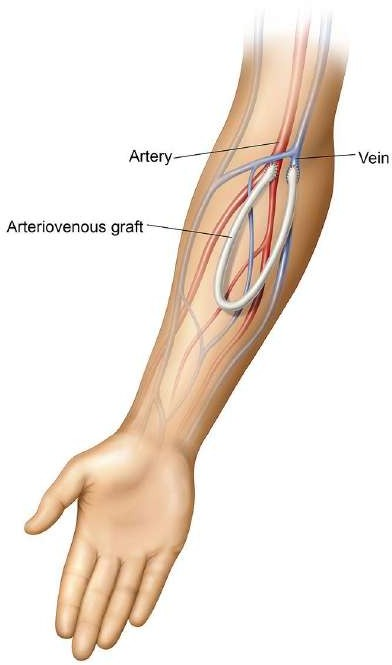A nurse is caring for a client who has a new arteriovenous (AV) graft in his left forearm. Which of the following techniques should the nurse use to assess the patency of this graft?
Measure the client's blood pressure to ensure it is higher in the left arm than the right.
Check the brachial and radial pulses of the left arm simultaneously.
Auscultate the antecubital fossa using a Doppler stethoscope.
Auscultate the site for a bruit.
The Correct Answer is D
Choice A reason: Measuring blood pressure di?erences is not a method to assess the patency of an AV graft.
Choice B reason: Checking pulses is important but does not confirm the patency of the AV graft.
Choice C reason: Using a Doppler stethoscope at the antecubital fossa is not the standard method for assessing AV graft patency.
Choice D reason: Auscultating for a bruit at the site of the AV graft is a common and non-invasive way to assess for patency.

Nursing Test Bank
Naxlex Comprehensive Predictor Exams
Related Questions
Correct Answer is B
Explanation
Choice A reason: Specific gravity is typically increased in clients who have hypovolemia, not decreased, due to the concentration of urine as the body atempts to conserve water.
Choice B reason: Creatinine levels are indeed increased in clients who have acute kidney injury, reffecting decreased kidney function and filtration.
Choice C reason: Potassium levels are not necessarily increased in clients who have polyuria. Polyuria can be associated with a variety of conditions and does not directly indicate high potassium levels.
Choice D reason: BUN, or blood urea nitrogen, is typically increased in clients who have dehydration, not decreased, due to the concentration of blood solutes as the body conserves water.
Correct Answer is A
Explanation
Choice A reason: A distended bladder can cause low back pain due to the pressure and stretching of the bladder wall, which is often related to a urinary disorder such as urinary retention or obstruction.
Choice B reason: A stress fracture is less likely to be the cause of low back pain associated with an inability to void and a distended bladder.
Choice C reason: Nerve root pain typically presents with radiating pain down the leg rather than low back pain associated with urinary symptoms.
Choice D reason: Renal cancer could potentially cause low back pain, but it would not typically cause an inability to void or a distended bladder without other significant symptoms.
Whether you are a student looking to ace your exams or a practicing nurse seeking to enhance your expertise , our nursing education contents will empower you with the confidence and competence to make a difference in the lives of patients and become a respected leader in the healthcare field.
Visit Naxlex, invest in your future and unlock endless possibilities with our unparalleled nursing education contents today
Report Wrong Answer on the Current Question
Do you disagree with the answer? If yes, what is your expected answer? Explain.
Kindly be descriptive with the issue you are facing.
